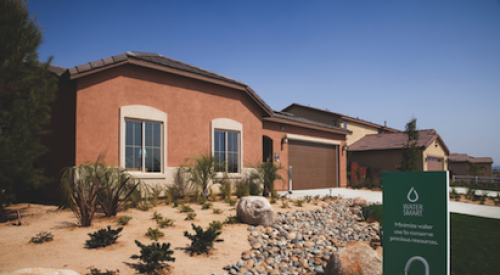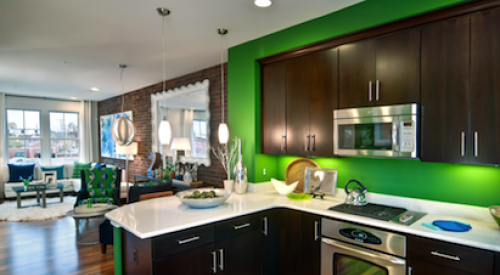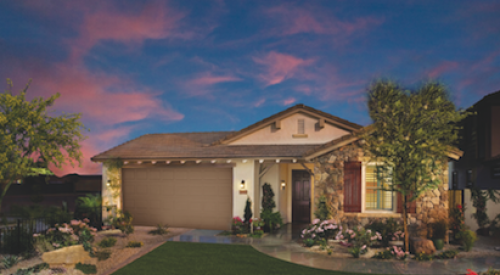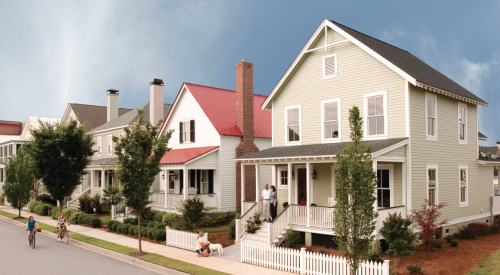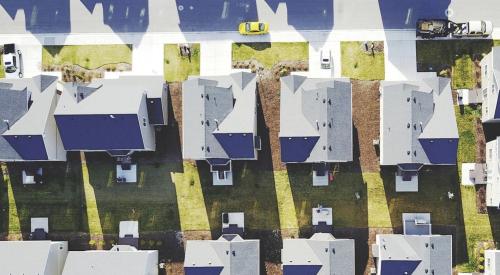|
Chicago's grid pattern dictates Bigelow's homes go on 25-foot-wide lots. He knocked a foot off the width and added a foot to the length of a TND plan he already builds in the suburbs.
|
|||||||
|
No one in America knows more than Perry Bigelow, chairman of Aurora, Ill.-based Bigelow Homes, about the challenges suburban home builders face trying to use their production building know-how to help inner-city neighborhoods meet the need for affordable ownership housing. But he also sees immense opportunities.
"Our program is replicable," he says. "We're selling detached, two-story, three-bedroom homes, priced at $114,100 (1,140 square feet), that include air conditioning, range, refrigerator, washer, dryer, window blinds and an annual energy bill guaranteed not to exceed $275. We'll build 100 or more of these a year, on lots the City of Chicago sells us for $1 each. We'll make money, and so will all our trades. There are 10,000 of these vacant lots scattered around the city in distressed neighborhoods."
But, Bigelow warns other builders, "You can't just waltz in and do this. A for-profit builder from the suburbs who tries, on his own, to do a program like the one we are doing in an inner-city neighborhood that is primarily African-American, will have his head handed to him on a platter. This is very political. The initiative has to come from a non-profit, community-based developer. We're the general contractor for Ezra Community Homes."
The developer is Chicago Metropolitan Development Association (CMDA), a non-profit arm of United Power For Action and Justice, a broad-based political coalition of churches and service industry labor unions. Bigelow, who is white, is a longtime member of one of United Power's partners, Lawndale Community Church, a primarily African-American congregation.
Bigelow's pastor asked him to get involved with CMDA's affordable housing effort under the city's New Homes For Chicago program.
A New Production Model
Bigelow, a devout Christian, agreed to take on the challenge, but only with important conditions: "New Homes for Chicago is great. It reduces city fees, simplifies processing and subsidizes buyers' purchases," Bigelow says. "But nobody in that program had yet to bring a real production process to it. They'd build half a dozen houses, sell them, then start over again. We said we'd do it only if CMDA streamlined marketing to create a backlog of sales that would allow us to build houses on an even-flow production pipeline."
To get United Power enthused about what Bigelow, operating under the CMDA banner, could produce, he brought a delegation to see Hometown Aurora, an affordable suburban TND community.
"We showed them a 1,160 square-foot house, a two-story with a footprint of 20x29 feet (and no basement), that we sell for $145,000, with a two-car garage, on land we develop with significant costs they don't face," Bigelow says. "We explained we could build that same house, just a foot narrower and a foot deeper, to fit a 19x30 footprint on a 25-foot-wide city lot."
Bringing the City Onboard
Then Bigelow brought a delegation from the City of Chicago to Aurora. "We explained that the only way to make this work is with a high-volume system," Bigelow says. "They agreed to accommodate us through program processing. That's not a simple concession when you consider the extra administrative steps that go with subsidized housing. Buyers have to be qualified and approved. The housing has to be inspected in special ways to verify it meets standards."
In Hometown Aurora, Bigelow produces on a pace of a house every other day. "For Ezra Community Homes, we asked our trades to follow us in cutting their per-house profit in half," Bigelow says.
That's possible because the homes in the city will be built on a vastly accelerated schedule - 30 working days from start of framing to closing. "We're building in tough neighborhoods, where anything that's not under lock has a tendency to disappear," he says.
Bigelow also asks his trades to include as many city residents as possible in work crews and will re-invest a large portion of the profits he makes on Ezra Community Homes into a job-readiness training program.
The homes Ezra builds are heavily panelized to lower the time required for onsite labor. The two plans, each with the same openings for windows and doors, offer few options. "Everything we do is predicated on speed. Every trade except the drywaller has just one day in the building," Bigelow says.
The initial area of Ezra's operations is 88 scattered vacant lots in a six-square-block neighborhood of North Lawndale, 4 miles west and a mile south of Chicago's Loop. CMDA will go through the local alderman to the city for another 100 lots.
Bigelow's model homes open >July 2. Sale prices range from $114,100 to $117,800 for 1,140 square feet, and the larger plan of 1,380 square feet goes for $138,800 to $139,200.
United Power went to major church denominations in Chicago (including Roman Catholic, Missouri Synod Lutheran, Episcopalian and Baptist) to establish a working capital fund for Ezra. That fund now totals $3,250,000. City subsidies range from $10,000 to $40,000 for buyers with incomes from 60 percent to 120 percent of Chicago's PMSA median.
"I'd like to see other builders do this in major cities across the country," Bigelow says. "Political support and speed are the keys. We create affordability by getting the lots from the city and building the houses very fast. But they are great houses, and they'll create pride of ownership, something inner-city neighborhoods desperately need."
